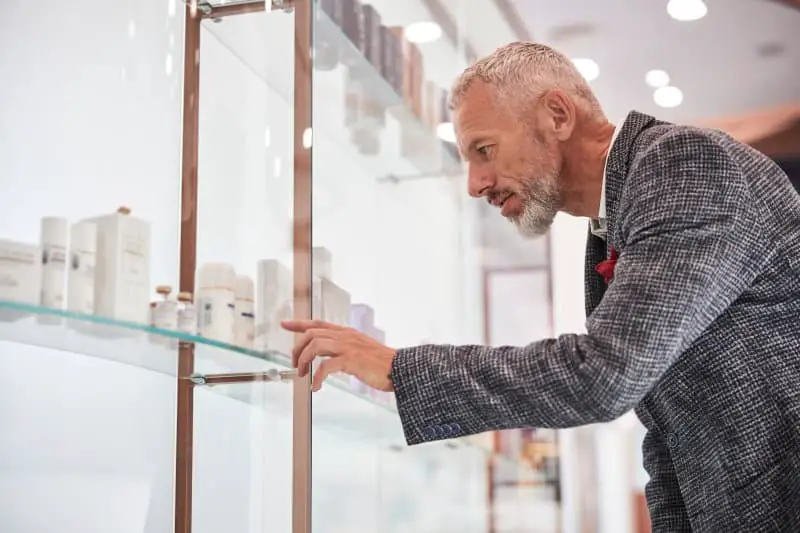If your facial hair is coming in blonder or redder than the hair on your head, it could be an issue of melanin content. Melanin is the pigment in your hair (and skin) that imparts color and protects it from the elements. The melanin makeup of your hair determines how dark it is. Additionally, as you age, melanin decreases, causing your hair to become white.
There are plenty of ways to encourage melanin development in your body through diet and lifestyle choices. However, there’s no medically proven way to boost your hair’s melanin content through topical or ingestible supplements. To positively affect your beard’s melanin content, you should focus on life choices and not on packaged remedies.
With that in mind, here is how melanin works in your body and how you can improve the likelihood that the pigment continues to propagate.
How Melanin Works
Melanin is carried to your follicles by cells called melanocytes. These cells hang out in the roots of your follicles and feed pigment into your hair. Melanin protects against the sun’s UV rays. It also makes your hair more resilient against dry conditions.
There are two types of melanin that affect hair. Eumelanins create darker shades, and pheomelanins create red tones. Black and brown hair contains lots of eumelanins. Blond hair has little. Strawberry blonde and red hair have increased levels of pheomelanins.
Whatever the melanin composition of your hair, it will start to decrease as you get older. The pigment will disappear from your hair over time, causing your hair and beard to go gray, then white.
If you are concerned about melanin content in your beard, it’s normally for one of two reasons. Either your beard is coming in lighter than the rest of your hair, or it’s starting to go white.
Let’s look into the reasons for both of these issues.
A Hair/Beard Disconnect
In general, melanin is not distributed evenly throughout your follicles. Even if your hair looks like one solid color, it’s composed of many different variations. How light or dark an individual hair is will depend on the amount of eumelanin feeding into it.
Simply put, your facial hair may not have as much eumelanin as the hair growing from your scalp. When this is the case, your beard will be lighter. It also might be the case that the follicles in your mustache have less eumelanin than the rest of your beard, leading to a disparately blond soup-strainer.
There is also an occasional mutation of the MC1R gene in your sixteenth chromosome that can result in pheomelanin appearing in your face but not your scalp. The mutation is why some guys have reddish facial hair that doesn’t match the hair on their heads. Don’t fret, though. This is an innocuous mutation that doesn’t portend dangerous health issues.
Disappearing Melanin

Nothing lasts forever, least of all melanin. As time goes by, the melanocyte stores that feed pigment to your hair become depleted. Unsurprisingly, this results in your hair losing its pigmentation.
Here is a word of caution. Just as melanin isn’t distributed evenly in your body, it also doesn’t disappear predictably. You might be twenty-five with a luxurious black beard, then suddenly a handful of hairs turn white. Most likely, they are aberrations and nothing to worry about. You can snip them away and not worry about full graying until decades later.
On the other hand, you might go fully white early. It’s all a matter of genetics and a few lifestyle choices.
Preserving Your Melanin Stockpile
So, what can you do to bolster and increase the melanin content in your facial hair?
As a general rule, you can make dietary choices to foster good melanin production. You should try to incorporate these foods into your daily diet:
- Foods high in antioxidants like beans, leafy greens, blueberries, and dark chocolate.
- Food with copper content like crab, almonds, lentils, liver, and mushrooms.
- Foods rich in Vitamin A like carrots and fish.
- Foods rich in Vitamin C like citrus and berries.
- Foods rich in Vitamin E like nuts, seeds, and grains.
- You can supplement these foods with Vitamin B6 and B12, which increase red blood cell and enzyme production. This further feeds hair follicles and encourages melanin production.
- Stay hydrated!
There are some things to avoid, as well, if you want to maintain good melanin content in your beard. Caffeine and salt, to begin with, will stymie the hydration you need for this process. Smoking tobacco also speeds the depletion of melanocytes.
Finally, don’t buy into the myth that stress will make your hairs lose pigmentation faster. There are plenty of good reasons to reduce stress in your life, but white beard hair is not one of them.
Melanin-Boosters in a Bottle

The market is full of unguents, pills, and potions promising to roll back the tide of time in all areas of life. This is just as true in the world of men’s grooming.
In total, no scientific research has shown a conclusive way to increase melanin. The tips listed above might help slow its depletion, but any product that promises to increase your melanin content is selling you a bill of goods.
This is the case particularly with beard oils and balms that boast of melanin improvements. While it’s true that many of these products contain ingredients that are good for hair health, what goes into your body is far more important than what goes onto your face. It’s neat that a pricey face salve might contain Vitamin E, but you’re better off just eating some sunflower seeds.
Melanin-boosting supplements have a bit more efficacy. Most of them are multivitamins geared toward providing the nutrients listed in the diet section. A single capsule might seem more efficient, but you can achieve much of the same effect by paying attention to what you eat.
One product that might be more useful than other supplemental options is Biotin. This supplement has shown more effectiveness in nourishing and strengthening facial hair than most health remedies. If you want to augment your melanin-fostering diet with a daily Biotin pill, that could be worthwhile.
The Bottom Line
There are many lifestyle changes you can make to extend the life of your beard’s melanin content. A diet rich in antioxidants, copper, and vitamins A, C, and E is a great start. Still, there’s no catch-all solution to a light or graying beard.
If you are considering dyeing as a solution to light facial hair, you certainly may want to check out our recent article discussing some, ahem, alternative uses for this dye.

